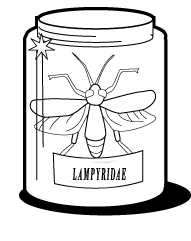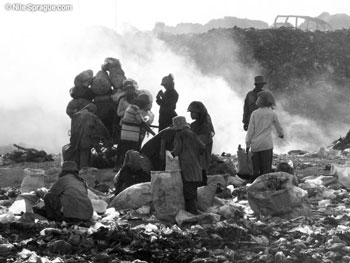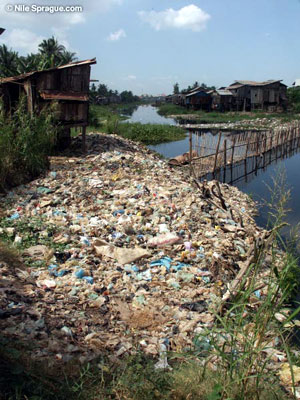

No. 2
March 2005
Firefly Journal
Because the End Times Never End and Everything is Still Possible
Contents |
About Firefly |
Archives |
Search

The sun setting in Chiang Mai last month looked like a blood orange in mud. It reminded me of the early eighties in Los Angeles, when I feared for my grandchildren a future devoid of blue sky. After moving with my kids in 1983 to Mendocino with its clean air on the north coast of California, I wrongly assumed that Los Angeles represented the worst case and that rural places in so-called third world countries remained untainted. The irony is that twenty-one years later due to regulation, L.A.'s skies are cleaner now than they were then, while Southeast Asia's skies are murky with all kinds of pollution, including plastics regularly burned with mounds of garbage.
I picked up one issue of the Phnom Penh Post and read that acid throwing (angry people throwing acid in one another's faces) was on the rise.
When we arrived in Bangkok after a five-hour flight from Tokyo in late February, the city was so big and dirty that we left immediately, flying to Ko Samui in the Gulf of Thailand near Malaysia. There under the full moon at a restaurant festooned with strings of Christmas lights we sat in sling chairs with our feet in the surf and drank mixed fruit shakes. We thought we were in paradise and maybe we were but by morning the sea had deposited garbage all along the beach. Each hotel sent someone out to clean up the mess within their own boundary lines.
Traveling on to Chiang Mai in the north of Thailand, we anticipated the beauty our friends had described but instead found a city filthy with air pollution compounded by agricultural burning which was going on all over Thailand.
"We could leave," Steve said but we had already booked our hotel and departure tickets. We decided to stay and look for the beauty others had seen. It was in Chiang Mai that we found our favorite temple: Chedi Luang, dating from 1441, next to an immense yang tree planted in 1796. In Buddhist cosmology chedis stabilize points where heaven and earth meet. They chase away ignorance and chaos. Chedi Luang was built by a son to honor his father and it sits in a courtyard lit at night and populated by a bevy of dogs fed by the monks. Nearly every one of the ten nights we stayed in Chiang Mai we followed the local custom of walking three times around Chedi Luang for good luck. Our prayers did not bring blue sky.
To escape the pollution, we left Chiang Mai a couple of times, trekking into the mountains to a Hmong village through a burned jungle still smoldering. We crossed a bamboo bridge swinging over a river gorge. We rode elephants and rafted on bamboo but we didn't escape the dirty air.
Another day we headed farther north, three hours by bus to Chiang Rai near the Burma border. Here, too, the sky was brown. So we quickly caught a ride with a taxi truck. Thinking that a higher elevation would help, we went to the top of a mountain at the village of Mae Salong in an opium growing area in the golden triangle. Burning rice fields made the air worse. Without the slightest breeze it hung thick as dirty curtains so we couldn't see the mountains around us, so gorgeous in the guidebook photos. All night smoke burned our lungs. In the morning we escaped back to Chiang Mai by air-conditioned bus. Only the air conditioning was broken. Instead of cool air it pumped stale hot air laced with carbon monoxide until we both were woozy. I fantasized breaking a window to breath. Somehow no one passed out. That night I dreamed of lion attacks and of my son levitating naked in a big old oak tree. Power unleashed, I guess. I was hoping for a solution.
I wrote in my journal: "It makes my heart cringe to move about in such filth and to breathe and see nothing but a gray pall over rice paddies and banana trees."
Back on the temple circuit in Chiang Mai, aware now that air could be dirtier, we met a Japanese businessman who told us he had his blue silk shirt made by a Chiang Mai tailor in two and a half hours for $37. He said he had suits made for $100 each and sold them in Japan and the United States for ten times as much. Meanwhile the mountains around this valley were obliterated by a brown gray scum.
We went to a wood carving factory and saw beautiful rosewood and teak furniture carved with elaborate detail. A salesman told us we could have a solid rosewood table and six chairs delivered to San Francisco, insured, for $3,000. Although I'm not a shopper, I could see that Chiang Mai was a shopping mecca.
Finally our departure date arrived and we headed back to Bangkok by train passing through wild jungle and mountains. A thick smog settled heavily on every leaf. The sun rising in the murk was eerie, horrible. Where's the joy in a day without color?
Staying one night in Bangkok, we fled in the morning to Siem Reap, to the temples at: Angkor Wat. The Cambodian sky, being distinctly bluish, was an improvement. Siem Reap is a classic, dusty frontier town low on regulation. There are cell towers and antennas everywhere, several per block. Trash piles in the gutter.
We bought a 3-day pass to Angkor Wat for $40 each. We had to be photographed by the government. We had to show our pass at multiple check points. On our first day, the driver pointed out the Khmer Rouge Killing Field enroute.
Our driver the second day, our favorite, Mr. -- told us he was born in Phnom Penh in 1967. When he was 8 years old the Khmer Rouge marched into the city on April 17, 1975 and got everyone to flee by saying the Americans were about to bomb. And the nightmare began of slave labor, starvation, torture, division of families and execution. It was a time when love was a dirty word and to be called illiterate was praise. I suppose the goal was lofty: to return to a pastoral existence and shun the greedy Western way of life. Watches, televisions, and education were forbidden. Unfortunately, that goal was used to justify heinous crimes against humanity.
Mr.-- did not tell us the specifics of his story, only acknowledged he'd lost his entire family save one cousin. Continuing to feel that Phnom Penh was unsafe, he'd moved his family a few years ago to Siem Reap. Although he probably had not much formal schooling, Mr.-- seemed more like a University professor than a tuk tuk driver. He told us he taught himself English by offering free rides to native English speakers who would converse with him. He could not work as a guide because he could not afford the $1,000 license fee.
The competition among drivers was intense. The going rate was $6 for a full day of driving a customer to the temples and waiting there to escort him home in the evening. We invited Mr.-- to have lunch with us at a food stand across from Angkor Thom and we were delighted when he accepted. Although we all ordered, Mr.-- was never served by the Cambodian staff. I was about to get indignant when I saw his face and knew to keep quiet. "Why?" I asked him. "Because I am the driver," he said. "They do not think it right for me to eat with you." He told us many Cambodians suspect that Pol Pot is still alive, that he faked his death and cremation hid the evidence.
Everywhere we go explosions of tiny, dirty children walk alongside with hands extended repeating a mantra in a dull whine: "Give me money." They repeat and repeat and repeat: "Give me money." And they will turn money down if the bill isn't big enough. At every temple hawkers with bells, and t-shirts, flutes and colored scarves repeat: "Buy from me;" "I saw you first;" "Over here;" "Want a coconut;" "Want a coke?" So much desperation and need that I could not fill if I handed over all my resources and became a beggar myself. What is the answer?
In Siem Reap I was eating breakfast at a sidewalk cafe when a woman came up behind me and jabbed me hard in the ribs. Dirty and sullen, she put out her hand aggressively with hatred in her eyes and it hurt; but I opened my small bag and pulled out the only bill I had and gave it to her. I complied quickly so she would go away. I realized how submissive I can be, how compliant to a stranger's wrath. A Dutch restaurateur told us he never gives beggars money but food each night. "They have pimps and sniff glue," he claimed.
Cambodia has tiny sweet bananas and very sweet oranges but the violence of the Khmer Rouge years has not been resolved. Popular estimates in the street are that 70% of the population is psychologically damaged whether they were alive in the time of genocide (1975-1979) or not. I picked up one issue of the Phnom Penh Post and read that acid throwing (angry people throwing acid in one another's faces); human trafficking and HIV are on the rise. There was an interview with Pol Pot's former body guard who said he wished the Khmer Rouge were still in power but meanwhile please unify to help complete a city project.
The Khmer Rouge are estimated to have murdered two to three million Cambodians in four years. Survivors' accounts are horrific. We visited Toul Sleng Prison in Phnom Penh where, like the Nazis, the Khmer recorded their atrocities with photos. Ten to fifteen year olds were guards in charge of ripping off fingernails and other torture of babies, children and pregnant women. Some killed their own parents. I was afraid but went in order to face the darkness. One photograph in particular haunted me. It was of a beautiful young mother holding her baby with such dignity. I suffered nightmares. I had to stop reading survivors' accounts for a time. It was overwhelming.
Cambodia today is a constitutional monarchy. A young Cambodian woman who guided us around the grounds of Sihanouk's opulent palace told us that young people in Cambodia appreciate George W. Bush because he supports the opposition party and democracy. Sihanouk spends most of his time at his palaces in China and North Korea. Many told us that Sihanouk is not a popular king. His people live in great poverty; many of the men are missing legs and arms from land mine explosions which continue to plague the countryside. There's trouble in paradise when you can't go off the beaten path, even at heavily visited tourist sites, without risking exploding body parts.
 Cambodians hearken back with pride to the time when their temples were
built at Angkor Wat in the 9th century, when they ruled Southeast Asia. Like
the Thais, they eat insects but also fried spiders. One night, while
watching a dance troupe, I realized I was eating what I thought was a
mouthful of larva with rice pudding.
Cambodians hearken back with pride to the time when their temples were
built at Angkor Wat in the 9th century, when they ruled Southeast Asia. Like
the Thais, they eat insects but also fried spiders. One night, while
watching a dance troupe, I realized I was eating what I thought was a
mouthful of larva with rice pudding.
Cascades of bougainvillea and hibiscus color the balconies in Phnom Penh. Lots of unpaved streets with garbage piled and rotting in the sun, releasing vile smells. One is too hot to resist. French colonial buildings, nothing over 4 stories, line the river front at the confluence of the Tonlé Sap and the Mekong Delta. Lots of rice, noodles, pork, chicken, shrimp, vegetables, hot chili peppers and coconut milk. Bicycle rickshaw drivers sleep sprawled in their bike chairs clustered along the sidewalks at night.
The heat in March rises to 99 degrees with 70% humidity. Out walking, I recognized in my own fragrance the smell of a my little brother after a sweaty day of running in the sun and rolling in the dirt. Only I smelled of garlic, too, which we ate in fresh chunks on buttered toast.
It was quite a drive from Siem Reap to Phnom Penh. Just a few years back the road was prone to ambush by bandits. It's one of the main roads in the country but large sections of it are still dirt. It was a five-hour ride in a high speed taxi dodging skinny cattle, pedestrians, dogs, motorbikes and bicycles. The whole way our driver honked and the car bounced wildly through ruts. An artificial air freshener on the dash made my head ache. Yes, there were cell towers and air pollution.
You would not believe how many pressures and demands one could fall prey to in Southeast Asia. So many beggars with outstretched hands saying give me money; drivers of taxis, tuk tuks, rickshaw bicycles, motorbikes waiting outside of restaurants, hotels, Internet cafes. Coming and going is like running a gauntlet of need, "Where you go?" So much pleading to drive us somewhere and once a ride is taken, the driver always wants to wait for the return fare even if he waits for hours and is paid only a dollar more and then he wants to plan one's week. Even walking along the sidewalks drivers in traffic call out constantly while beggars, amputees on crutches, move their bodies in one's path, hat or hand outstretched, voices wheedling and plaintive.
I do not mean to complain about Southeast Asia. It was beautiful and intense with such resilience and spirit among the people but it troubled my heart deeply. I want it as everywhere on Earth to fulfill its promise of paradise for its people, and animals, its landscape. I want the blue back.
Web design copyright ©2005 Fireflyjournal.com.
Authors reserve all rights to their work.